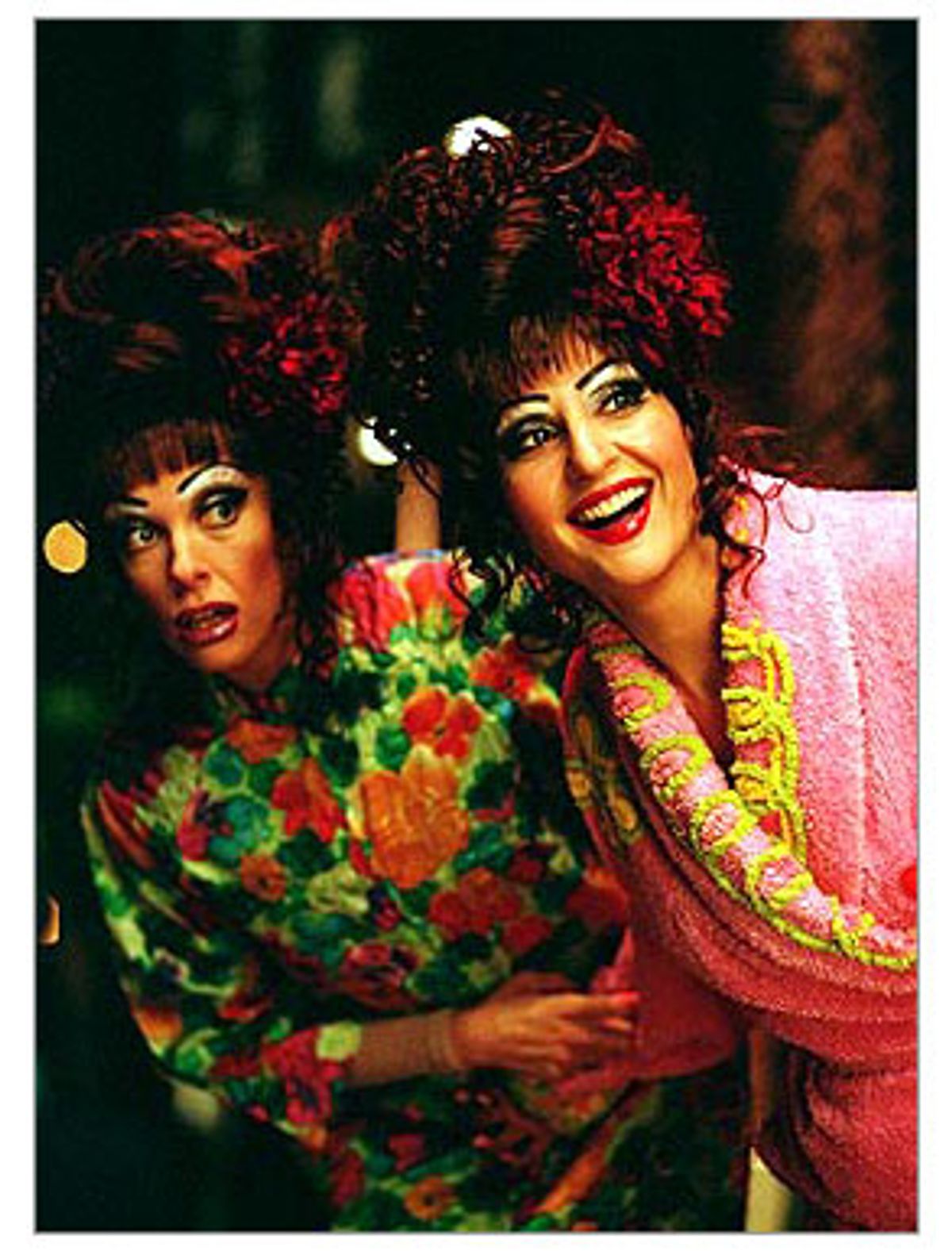The message of "Connie and Carla" -- and it's belted Ethel Merman-style, just to make sure we don't miss it -- is that following one's dreams is essential. It's also important to be a real woman and not to be hung up on weight, size or shape. Also, real women of all stripes deserve to be appreciated. And tolerance -- well, tolerance is good too, so why not add it to the laundry list?
"Connie and Carla," directed by Michael Lembeck and written by one of its stars, Nia Vardalos (of the big fat Greek sensation of 2002), isn't really a movie but a blatant girls' night out vehicle. Strangely, Madison Avenue no longer targets ads to "the little lady," offering her more choice, convenience and reliability, in a variety of colors from harvest gold to avocado. Women everywhere would be outraged if they were condescended to like that. But no one blinks twice when a comedy loaded with more fake uplift than a Wonderbra comes sashaying down the pike with a hot-pink "You go, girl!" banner stretched across its mountainous expanse. If "real women" are that easy to market to, no wonder so many have self-esteem problems.
But let's not talk about that. Let's just, as "Connie and Carla" urges us to, feel good about ourselves. The Connie and Carla of the title are, respectively, Vardalos and Toni Collette. Since they were little girls, Connie and Carla have loved to perform show tunes onstage. After years of practice and hard work, they've risen to headline a lounge act at a Midwestern airport, where they start out with "I'm Just a Girl Who Can't Say No" and segue, with a few seamless onstage costume changes, into "Memories."
These are just small-town girls filled with big dreams. But after witnessing a murder, they're pursued by Russian mobsters. Oh, how they scream and squeal as they drive their little car every which way, trying to evade these scary fellows! Their geese are cooked if they get caught; they must leave town, and fast. So they head for L.A. and realize that, while there's no dinner theater there, there are drag bars. Masquerading as men dressed up as women, they become overnight sensations at one of these clubs, forming fuzzy, warm, marabou-trimmed bonds with their newfound girlfriends.
"Connie and Carla" features one musical number after another: Here's Connie and Carla all dolled up to perform "Don't Rain on My Parade," from "Funny Girl"; here's Connie and Carla, in robes and sandals, singing the bejesus out of "Everything's All Right," from "Jesus Christ Superstar." You may begin to wonder, What are these characters like as people? By the time we've learned that Carla is ditzy and shrill, and Connie is good-natured and sensible yet lovably flighty, you may long for them to get back to their singing, which is at least entertaining.
Some of the pals who enter their dizzy orbit are fun to watch: Alec Mapa is Lee, a diminutive sweetie who gets laughs, effortlessly, by breathlessly offering to let Connie and Carla borrow his jewels. And Stephen Spinella, as Robert (his stage name is "Peaches"; Lee is his partner, and he goes by the name "N'Cream"), does his damnedest to pull some real emotion out of his character's stock situation: Robert left home years ago, and hasn't been in touch with his family since. Now his brother, Jeff (David Duchovny), wants to be back in touch with him. The problem is, Jeff just doesn't approve of Robert's big fat Greek lifestyle. What's a girl to do?
Obviously, Jeff comes around. But even though Duchovny gives one of his characteristically amusing, deadpan performances, it's impossible to buy him as an unimaginative (or even just an uncomfortable) bigot. Duchovny has such a sly, mischievous presence; he ought to be playing the kind of character who prefers gay men to boring old straight ones.
But then, that wouldn't serve the movie's purpose, would it? Worse yet is the way Collette is wedged, as if she were something of an inconvenience, into "Connie and Carla." Collette is a wonderful actress, and, I think, a great beauty in the manner of Bette Davis. But I've never seen Collette as shrill and papery as she is here. Vardalos is the kind of actress who plays a character in huge loops, and Collette's natural palette is subtler and more resonant. The two of them are fine in their musical numbers, but when it comes to their dialogue together, they jostle against each other clumsily. Vardalos plays every scene with Chaucerian-slash-Vaudevillian sauciness. She's nauseatingly overbearing.
And while it's very nice that Vardalos has been embraced as an actress who looks like a "real" woman, as opposed to a cookie-cutter string bean, it made me a little queasy to see how even in her drag makeup, she's never allowed to look too scary, too potentially unpretty, here.
On the other hand, Collette gets the full Max Factor treatment -- she's made up to look gawky and funny. In her drag makeup (which she wears for most of the movie), with her exaggerated Joan Crawford eyebrows and mammoth Lucille Ball lips, she resembles the performance artist Lypsinka, only not even as pretty. Collette is the obvious second banana here, which means that she can't outshine the star. But should she have to go through the movie like a walking punch line?
For all the rah-rah clatter of "Connie and Carla's" relentless positivity, it's still the friendly, vivacious, "conventionally pretty" girl who gets the guy. The real message of "Connie and Carla" is that while some like it hot, the rest are perfectly happy if it's only lukewarm.



Shares